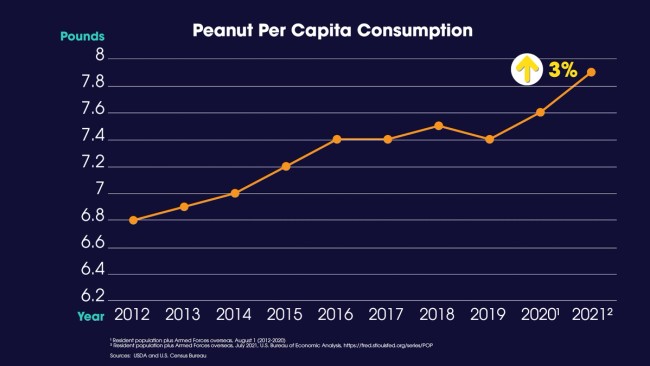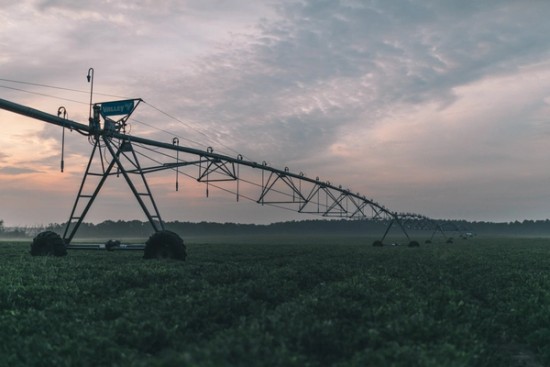OCTOBER 18, 2021 – ATLANTA – For the second year in a row, the check off for America’s peanut farmers celebrates an unprecedented level of per capita peanut consumption. Calculated based on USDA and U.S. Census data, per capita peanut consumption has risen to an all-time high of 7.9 pounds in 2021. This tops the previous record of 7.6 pounds in 2020 and reflects an increase of 3%.

“People may be surprised to learn that peanut consumption was at an all-time high during the pandemic, but after more thought, it makes sense,” said Bob Parker National Peanut Board (NPB) president and CEO. “We would never wish for business growth under these circumstances; however, we take pride that peanuts have helped people meet their nutritional, convenience, financial and even emotional needs during stressful and hectic times.”
Peanuts’ ability to meet the various needs of consumers is reflected in the new data of a second consecutive year of record-breaking increases in per capita consumption. This achievement is made possible through continued collaboration and efforts across the peanut industry. Farmers, buying points, shellers and manufacturers strive to supply quality products to consumers and many industry organizations work together to contribute to these accomplishments. This dedication and hard work are reflected in these recent gains.
Driving awareness of peanuts and consumption through consumer marketing is a Board priority. For the past several years, NPB focused on reaching the millennial generation, who can have the largest impact on peanut consumption. However, our 2021 campaign, Grow It Yourself, invited Gen Z to the table by introducing them to the wonderful world of growing your own food. Over the past year, NPB has successfully tapped into what millennials and Gen Z love. The first activation allowed for consumers to receive a greeting card with a real peanut in it that they could grow themselves. For those who wanted a little less commitment, consumers were able to adopt their own virtual peanut plant on TikTok. Targeting a younger demographic, TikTok users were able to get a tasted of what it feels like to plant, nurture and grow peanuts virtually.
“Part of the Board’s objective is to increase consumption of peanuts through promotions,” said Andy Bell, Georgia peanut farmer and 2021 chairman of NPB. “That can be a challenge when peanuts are already the most popular and preferred nut. But through creative promotions, exports and new products, things are good in the peanut industry and we keep reaching new heights.”
Although only 1-2% of the population is estimated to have a peanut allergy, NPB has continued to invest heavily in this area to find solutions for peanut allergy. Since 2001, to date, we have invested nearly $43 million in food allergy research and education, which has led to national guidelines to help prevent peanut allergy and the first FDA-approved treatments for food allergies. At the end of 2020, the USDA and HHS released their Dietary Guidelines for Americans (DGAs), which for the first time ever included a section on infants and young children. The guidelines recommend that introducing peanut foods as early as 4-6 months helps prevent potential peanut allergies. NPB continues to advocate for awareness and adherence to the guidelines with pediatricians and other influential health professionals, including support of the American Academy of Pediatrics continuing education course on early introduction of peanut foods.
“Peanut consumption at an all-time high, brands creating new associations for the consumer, manufacturers developing interesting and innovative new products and momentum on early introduction from the new DGAs will all help drive the incremental sales needed to continue growing peanut consumption,” said Ryan Lepicier, NPB senior vice president and CMO. “While these factors are all very different, they point back to why so many of us fell in love with peanuts and peanut butter again over the past 18 months. They meet some of our most basic nutritional needs. They provide safety in knowing we can help prevent a baby from developing a peanut allergy. And something as delicious as a PB&J can provide the comfort we need to get through challenging times.”
###
About the National Peanut Board (NPB)
The National Peanut Board represents USA peanut farmers and their families. Through research and marketing initiatives the Board is finding new ways to enhance production and increase consumer demand by promoting the great taste, nutrition and culinary versatility of USA-grown peanuts. For more information about the board, visit www.nationalpeanutboard.org. For more information about the early introduction of peanut foods to prevent peanut allergy, visit www.preventpeanutallergies.org.
